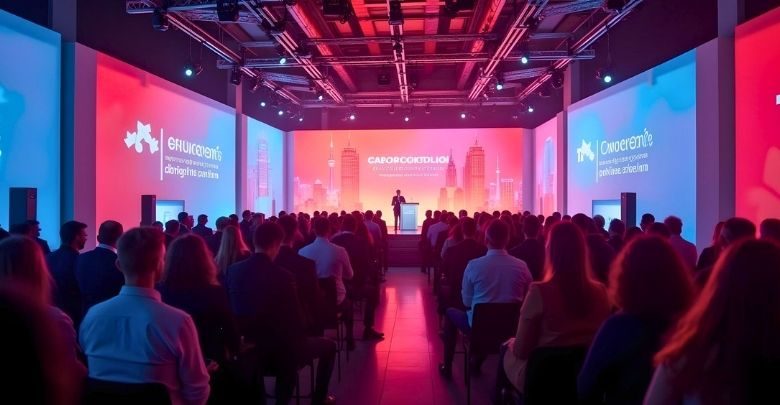Many conferences today are designed to meet the specific needs of various interests and professional fields. Among these conferences, the humanities conference is one of them, which stands out as an essential gathering focused on exploring human culture, values, and societal dynamics. You might be wondering, “What is a humanities conference?”
A humanities conference serves as a platform for scholars, researchers, and students to exchange ideas and share knowledge. It promotes interdisciplinary collaboration, where attendees can network with peers while gaining insights into various topics related to literature, philosophy, history, and more. These conferences create a vibrant atmosphere for intellectual engagement and exploration, essential for advancing understanding in the humanities.
Do you want to know more about this rewarding experience? This article invites you to explore the ins and outs of humanities conferences, providing you with all the necessary information about what they entail and why they matter.
The Rise of Humanities Conference Over the Year
A growing interest in human culture, values, and society is demonstrated by the Rise of Humanities Conference. Each year, scholars, students, and educators gather from across the globe. They discuss subjects like literature, philosophy, and history, focusing on the significant role of the humanities in today’s world.
Over the years, these conferences have expanded, welcoming new voices, ideas, and insights. Attendees exchange ideas and share research, exploring different issues and trends. Such gatherings offer valuable perspectives on our past and present, facilitating connections among people passionate about the humanities.
This year, experts anticipate that new topics will spark deeper discussions among attendees. If you’re planning to attend the upcoming international humanities conference, you can expect engaging conversations and inspiring ideas. This event provides a unique space for sharing knowledge and embracing diverse perspectives in the humanities.
What is a Humanities Conference?
A humanities conference serves as a platform for scholars, researchers, and students to exchange ideas, share knowledge, and promote interdisciplinary collaboration. Attendees gain insights into various topics while networking with peers. Many exciting discussions and activities take place during these events.
Opportunities for Networking
Engaging in networking is one of the most significant advantages of attending a humanities conference. Meeting people from diverse backgrounds creates opportunities for collaboration and partnerships. Conversations with other attendees can lead to new projects, research ideas, and potential job opportunities. Making connections at such events can benefit one’s career and academic life. Building a professional network can also provide support during challenging times in research or studies.
Introduction to New Ideas
Participating in a humanities conference exposes participants to a variety of perspectives and ideas. Presenters share their research findings and innovative approaches to different topics. This diversity helps broaden understanding and can spark inspiration for attendees. Learning new concepts can encourage critical thinking and motivate individuals to explore their interests further. These fresh insights contribute to personal and professional growth for everyone involved.
Opportunities for Collaboration
At humanities conferences, there are many opportunities for collaboration, which motivates attendees to work together on projects. By engaging with others, attendees can identify shared interests and goals. Working together can enhance research quality and produce more impactful outcomes. Joint efforts often lead to collaborative projects that deal with complex issues. Collaboration encourages creativity and encourages innovative solutions to real-world problems.
Skill Development
Participating in a humanities conference allows attendees to develop essential skills. Workshops, panels, and discussions often cover valuable topics, such as public speaking and effective writing. Learning from experienced professionals can help individuals enhance their communication abilities. These skills are vital in both academic and professional settings. Developing a strong skill set can improve one’s confidence and effectiveness in various areas of life.
Engagement With Experts
Conferences provide opportunities to engage with experts in the humanities field. Attendees can learn from seasoned researchers and academics who share their insights and experiences. Listening to keynote speakers can inspire and motivate participants to pursue their passions. Engaging in discussions with experts offers valuable feedback on personal research projects. This interaction fosters a sense of belonging within the academic community.
Presentation Experience
Giving a research presentation at a conference gives participants invaluable public speaking experience. Sharing ideas in front of an audience enhances confidence and poise. Receiving feedback from peers can improve one’s research and presentation skills. This experience also prepares participants for future academic or professional presentations. Practicing public speaking at conferences can lead to greater success in various career paths.
Building a Community
A humanities conference fosters a sense of community among attendees. Participants share similar interests and passions, creating bonds that often last beyond the event. Forming connections with like-minded individuals contributes to a supportive environment for collaboration and growth. This sense of belonging encourages continued engagement in the humanities field. Being part of a community helps individuals feel valued and supported in their pursuits.
There are many advantages to attending a humanities conference that enhance both professional and personal experiences. Engaging with peers and experts enhances knowledge while providing opportunities for growth. These conferences play an essential role in shaping the future of the humanities.
Who Attends the Humanities Conference?
People from a variety of backgrounds who are passionate about learning about culture, society, and human expression attend humanities conferences. Participating in these gatherings offers a special chance to network, exchange research, and widen perspectives. Here’s a look at who typically attends and why they come:
Academics and Scholars
A number of academics and scholars participate in humanities conferences, presenting their research findings and engaging in intellectual debate. These events allow them to gain helpful feedback and explore new ideas while expanding their professional networks. This exchange of knowledge is vital for staying updated on emerging trends in their fields.
Graduate Students and Early Career Researchers
Early career students and graduate students participate enthusiastically in humanities conferences to exchange ideas and gain mentorship. Many of these conferences serve as entry points into professional academia, offering valuable insights into broader research landscapes. Additionally, the diverse viewpoints they encounter encourage growth and innovation in their areas of study.
Educators and Teachers
Humanities conferences provide educators with innovative teaching methodologies and opportunities to enhance classroom experience. Participants can engage with fellow educators, share ideas, and gather resources that can inspire their students. By interacting with a diverse range of educational approaches, teachers can significantly enrich their instructional practices.
Professionals from Related Fields
The purpose of humanities conferences is for professionals in publishing, communications, and culture to deepen their knowledge. They can generate fresh content ideas by engaging scholars and researchers. This collaboration fosters a bridge between academia and industry.
Independent Scholars and Enthusiasts
Many independent scholars and enthusiasts attend humanities conferences to fulfill their personal intellectual curiosities. These individuals may not have formal academic affiliations, but they attend because they are passionate about specific topics. It helps them develop a sense of community around shared interests by exchanging ideas and having informal conversations at humanities conferences.
A humanities conference brings together professionals, scholars, students, and enthusiasts dedicated to exploring human culture and society in depth, highlighting the benefits of attending a humanities conference. The diverse backgrounds of attendees make these events more valuable for all participants, creating an environment of collaboration, learning, and mutual inspiration.
What Makes a Humanities Conference Stand Out?
The addition of distinctive features that improve the overall experience for participants makes a humanities conference unforgettable. A combination of insightful discussions, engaging activities, and networking opportunities creates an environment where knowledge grows. These factors contribute significantly to making each conference stand out.
- Diverse Perspectives: Bringing together individuals from various backgrounds and disciplines enriches discussions and encourages innovative ideas. Attendees benefit from exposure to different viewpoints, which can lead to a more comprehensive understanding and collaboration on complex issues.
- Expert Speakers: Inviting renowned experts as speakers adds significant value to the conference. Their knowledge and experiences inspire attendees while providing insight into current trends and future directions in the humanities field. This can motivate participants to expand their own research and interests.
- Interactive Sessions: Incorporating workshops and interactive panels encourages active participation from attendees. These sessions allow individuals to engage directly with content, promoting collaboration and fostering a deeper understanding of the subjects being discussed.
- Networking Opportunities: Conferences provide a platform for building professional relationships. Meeting individuals with similar interests can lead to future collaborations and partnerships, enhancing the academic journey and career prospects of participants in various fields.
- Innovative Formats: Utilizing creative formats, such as roundtable discussions or creative performances, adds excitement to the event. These engaging activities encourage attendees to think outside the box and share their ideas in unconventional ways.
- Cultural Events: Including cultural activities enriches the conference experience. Such events allow participants to immerse themselves in the host city’s culture, fostering a sense of community and encouraging informal discussions and interactions among attendees.
- Community Building: Establishing a supportive environment promotes long-lasting relationships among participants. This sense of belonging encourages ongoing collaboration and engagement, making the conference a pivotal moment in the academic and professional lives of attendees.
A humanities conference can be a life-changing event that provides a wealth of chances for development, education, and networking. The unique elements discussed above contribute to creating lasting memories and inspire individuals to pursue their passions with renewed enthusiasm.
The Future of Humanities Conferences in a Digital World
As digital innovations change the way we connect and exchange knowledge, the future of humanities conferences is changing as well. Virtual platforms bring new opportunities, allowing people worldwide to engage in meaningful discussions and exchange insights, regardless of physical location.
Expanding Global Access
Digital conferences make it possible for a wider audience to join, breaking down geographic barriers. This expanded access encourages a diverse range of perspectives and ideas, enriching the experience for all attendees and fostering broader discussions across cultural boundaries.
Interactive Digital Experiences
With interactive tools and virtual features, digital conferences create engaging ways for attendees to participate. Features like live Q&A sessions, polls, and breakout rooms replicate the dynamic atmosphere of in-person events, enhancing attendee engagement and involvement.
Diverse Range of Topics
In a digital format, conferences can feature a more diverse range of discussions, allowing experts from various disciplines to contribute to topics are covered at a humanities conference that might not have been possible in traditional, in-person meetings.
Building Virtual Communities
Even from a distance, participants can create communities in a variety of ways because of digital spaces. Through social media groups, virtual lounges, and post-event forums, attendees can form lasting connections and share knowledge, ideas, and experiences in ongoing dialogues.
Accessibility and Inclusivity
Online conferences prioritize accessibility, offering closed captions, translations, and flexible session timings. This ensures that a larger audience, including those with differing abilities or time constraints, can participate and benefit from the insights shared during the event.
Conferences in the humanities can benefit greatly from using digital tools to expand their audience and promote creative dialogue. By taking advantage of these changes, future conferences will be more inclusive, engaging, and impactful.
Frequently Asked Questions About What is a Humanities Conference?
Passionate people come together to study human culture, society, and creativity at humanities conferences. Whether you’re a scholar, student, or simply interested in the humanities, you may have questions about these events. Below, we address some common inquiries that can help you better understand what a humanities conference is all about.
How Do Humanities Conferences Differ from Other Academic Conferences?
With a focus on human values and expression, humanities conferences cover topics such as literature, history, philosophy, and cultural studies. These conferences provide a platform for understanding human culture, social dynamics, and creative work in a broader context, unlike other academic conferences.
Are Humanities Conferences Open to Non-Academics?
Yes, humanities conferences are often open to non-academics. Independent scholars, enthusiasts, and even professionals from related industries attend these conferences to expand their understanding of cultural and societal issues. The events are welcoming to anyone with a passion for humanities topics, offering opportunities to learn, engage, and share ideas.
What Are the Common Themes Addressed at Humanities Conferences?
Humanities conferences explore themes like human identity, cultural heritage, ethics, and the impact of history on current societal trends. Topics might include anything from literary analysis to philosophical debates on ethics. The themes are diverse and provide a deep exploration of human life, culture, and expression from multiple perspectives.
Is It Possible to Participate Virtually in Humanities Conferences?
Yes, many humanities conferences now offer virtual participation options. With advancements in digital technology, attendees can join from anywhere in the world, engaging in discussions, presentations, and networking online. Virtual participation has helped make these events more accessible to a broader, global audience, breaking down geographical barriers.
Who Organizes Humanities Conferences?
Universities, academic institutions, cultural organizations, and occasionally professional associations host conferences in the humanities. These organizers aim to bring together scholars, educators, and enthusiasts to foster meaningful discussions and promote research in the field of humanities. The purpose is to advance understanding and connect like-minded individuals in a collaborative environment.
Last Briefs
Humanities conferences provide an inspiring environment for people passionate about human culture and creativity. These gatherings unite scholars, students, educators, and enthusiasts to explore topics that help us better understand our shared values, history, and experiences, providing growth and connection.
To answer “What is a humanities conference?” simply: it’s a platform where ideas are exchanged, insights are shared, and connections are built, all centered around human culture and society. Participants have the opportunity to learn, collaborate, and develop a deeper appreciation of the humanities.
As you consider attending a humanities conference, remember to stay open-minded, engage actively, and be open to new perspectives. These events are valuable learning opportunities. Enjoy exploring, connecting, and growing on your humanities path!








